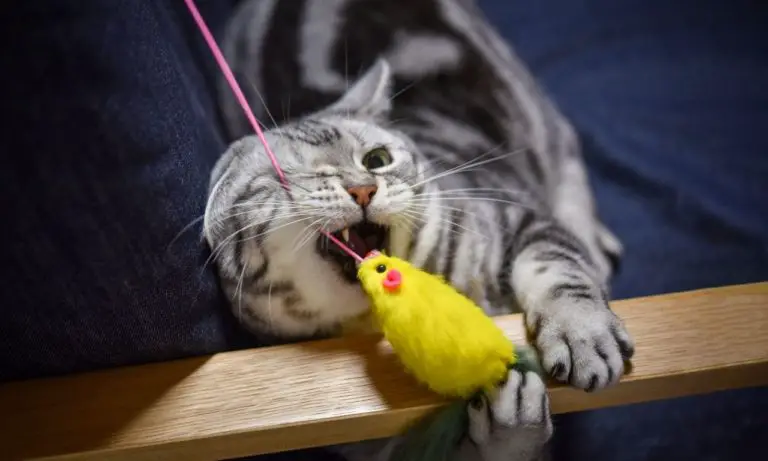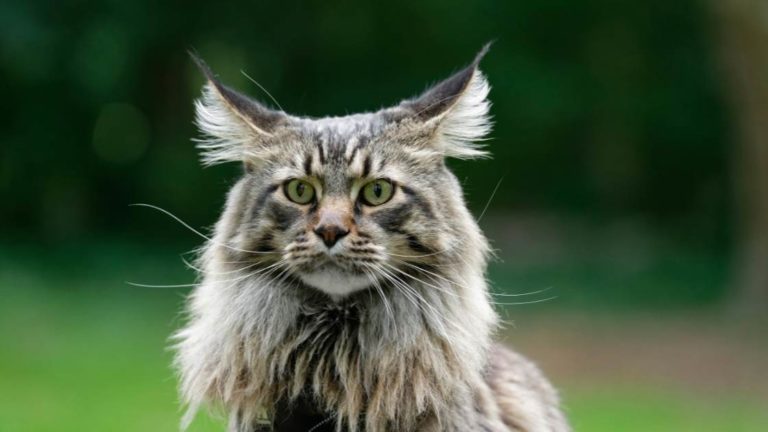Is Sandalwood Essential Oil Safe For Cats?
Sandalwood (Santalum album) is a tree native to India that has been used for centuries in Ayurvedic and Chinese medicine. The oil is extracted from the wood and is used in a variety of ways, including as a natural treatment for anxiety, depression, and insomnia.
While sandalwood essential oil is generally considered safe for humans, it can be toxic to cats if they ingest it. The oil can also cause skin irritation if it comes into contact with their fur.
Here in this blog post, I’ll try to answer why sandalwood oil may not be the best choice for your feline friend, and what may happen if they do come into contact with it.
Why Sandalwood Oil is Not Safe For Cats?
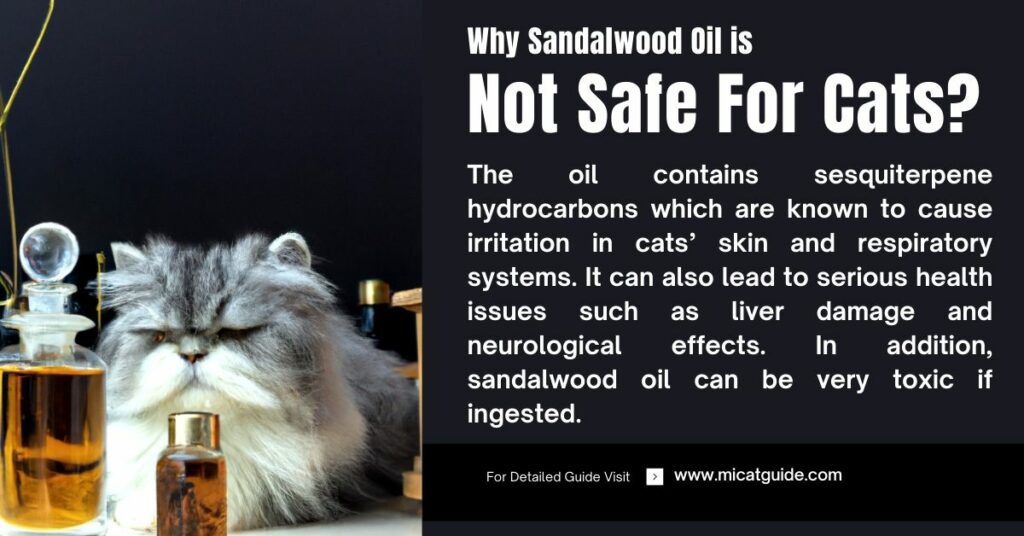
I know I’ve already mentioned this above, but it’s important to reiterate that sandalwood oil can be toxic to cats if they ingest it. Here I’ll go into a little more detail about why this is the case.
1. Sandalwood Contain Santalol
Sandalwood contains a chemical called santalol. Santalol is bad for cats and can cause them to become very ill. Ingesting santalol can cause liver damage, kidney failure, and even death.
There have been several studies conducted on the effects of santalol on cats. One study published in the Journal of Veterinary Emergency and Critical Care found that ingesting santalol caused liver damage in cats.
Another study published in The Canadian Veterinary Journal found that ingesting santalol caused kidney failure in cats.
2. Sandalwood Oil Can Cause Skin Irritation
Not only can sandalwood oil be toxic if ingested, but it can also cause skin irritation if it comes into contact with your cat’s fur. This is because the oil can be a skin irritant, and it can also be an eye irritant. In fact, one study found that sandalwood oil caused eye irritation in rabbits.
3. Sandalwood Oil May Cause Allergic Reactions
Another reason why you may want to avoid using sandalwood oil on your cat is because it may cause an allergic reaction. A research paper published in 2016 found that sandalwood oil was a skin allergen, and that it caused contact dermatitis (skin inflammation) in some people.
4. Sandalwood Oil May Be Carcinogenic
Sandalwood oil is a popular essential oil that is often used in aromatherapy. However, a recent study published in the Journal of Agricultural and Food Chemistry suggests that sandalwood oil may be carcinogenic on cats.
The study found that when sandalwood oil was applied to the skin of cats, it increased the number of tumors that developed on the animals’ skin. The researchers also found that the oil caused DNA damage in the cells of the cats’ skin.
While the study was conducted on cats, it’s possible that sandalwood oil may also be carcinogenic on other animals, including humans. More research is needed to determine if this is truly the case.
Also, check out Is Orange Essential Oil Safe For Cats?
Symptoms of Sandalwood Oil Toxicity in Cats
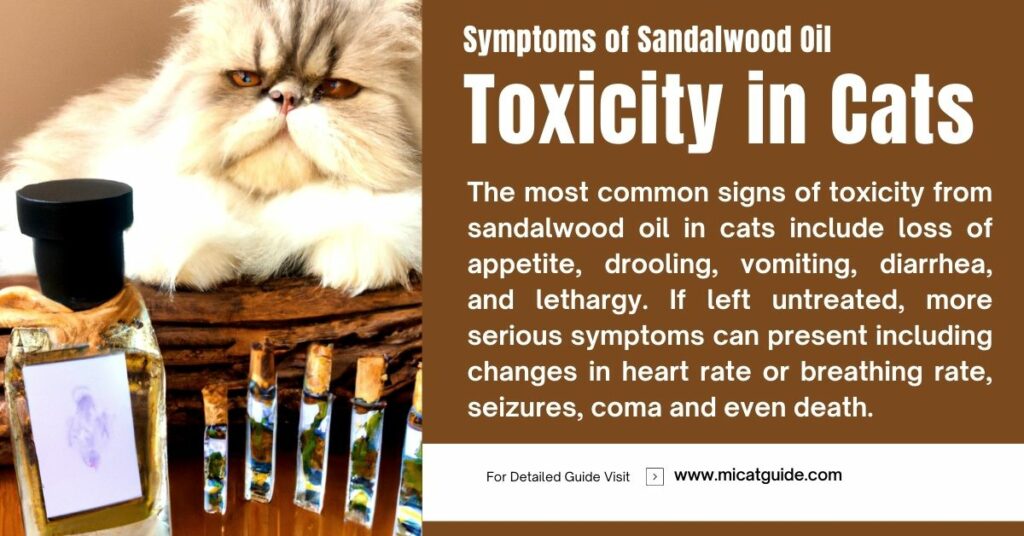
If your cat ingests sandalwood oil, they may start to show symptoms within a few hours. The severity of the symptoms will depend on how much oil they ingested.
Symptoms of sandalwood oil toxicity in cats may include:
- Vomiting
- Diarrhea
- lethargy
- Loss of appetite
- Jaundice (yellowing of the skin and eyes)
- Seizures
- Kidney failure
- Liver damage
Interesting Read: Is Vanilla Essential Oil Safe For Cats?
What Treatment to Expect on Vet Office?
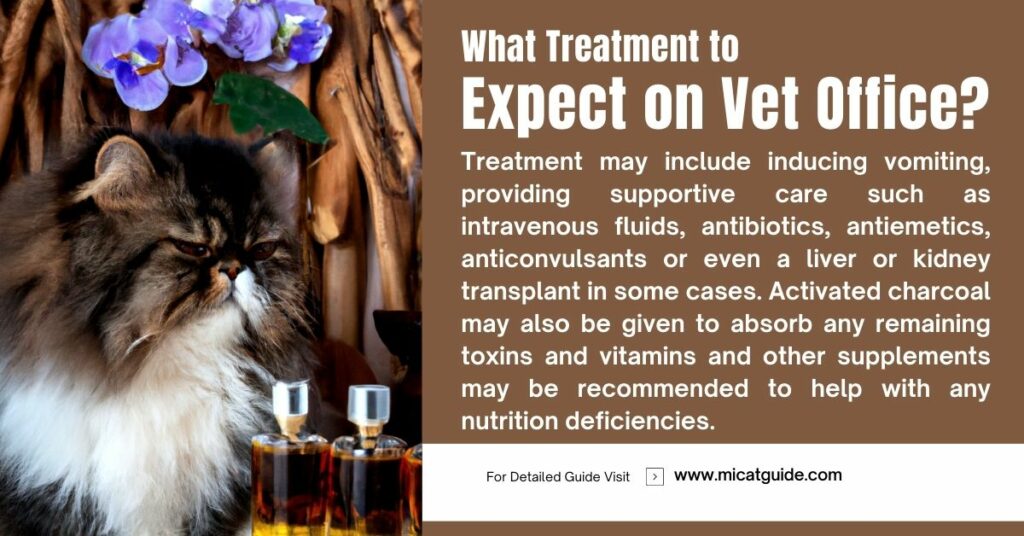
If you think your cat has ingested sandalwood oil, it’s important to contact your veterinarian right away. And from my experience I can say that what a cat owner can expect from the vet’s office is the following:
1. History of Your Cat’s Exposure to Sandalwood Oil
The veterinarian will want to know how your cat was exposed to the oil. If you know, be sure to tell the vet how much oil your cat ingested, and how long ago they ingested it.
2. Physical Examination of Your Cat
The veterinarian will then perform a physical examination of your cat. They will look for any signs of toxicity, such as vomiting, diarrhea, jaundice, or seizures.
3. Blood Tests
The veterinarian will also order blood tests to check for liver damage and kidney failure. These tests will help the vet determine how severe the toxicity is, and if your cat needs to be hospitalized.
4. Treatment
If your cat is showing signs of toxicity, they will likely need to be hospitalized for treatment. The treatment will depend on the severity of the toxicity, but may include intravenous fluids, blood transfusions, and liver or kidney support.
5. Follow-Up Care
After your cat is released from the hospital, they will need to be closely monitored for any signs of relapse. The veterinarian will likely recommend follow-up blood tests to check for liver and kidney damage.
You will also need to watch for any signs of toxicity at home, such as vomiting, diarrhea, or jaundice. If you notice any of these signs, contact your veterinarian right away.
Interesting Read: Is Lavender Essential Oil Safe For Cats?
How to Prevent Sandalwood Oil Toxicity in Cats?
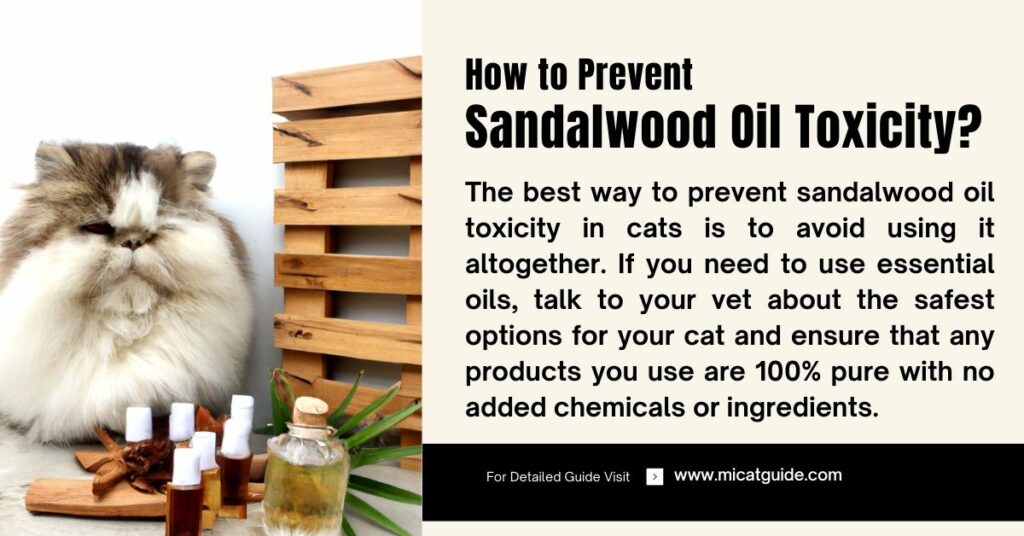
Here I’ll give you some tips on how to prevent your cat from being exposed to sandalwood oil:
1. Always Read the Label
When purchasing essential oils, it’s important to always read the label. Some essential oils, such as sandalwood oil, are not safe for use around cats. If you’re unsure about whether an essential oil is safe for use around your cat, contact your veterinarian for advice.
2. Keep Oils Out of Reach
Once you have essential oils in your home, it’s important to keep them out of reach of your cat. Store the oils in a safe place, such as a cabinet with a child-proof latch.
3. Avoid Using Oils Around Your Cat
If you do use essential oils around your home, avoid using them around your cat. Even if an oil is considered safe for use around cats, it’s still best to err on the side of caution.
4. Diffuse Oils Carefully
If you diffuse essential oils in your home, be sure to do so carefully. Keep the diffuser away from your cat, and diffuser in a well-ventilated room.
Interesting Read: Is Diffusing Essential Oils Safe for Cats?
My Final Thoughts
After doing some research, it is evident that sandalwood oil is not safe for cats. If your cat ingests the oil, they may experience symptoms such as vomiting, diarrhea, and seizures. If you think your cat has ingested sandalwood oil, contact your veterinarian right away.
To prevent your cat from being exposed to sandalwood oil, always read the label before purchasing essential oils. Once you have the oils in your home, keep them out of reach of your cat, and avoid using them around your cat. If you do diffuse essential oils in your home, be sure to do so carefully.

